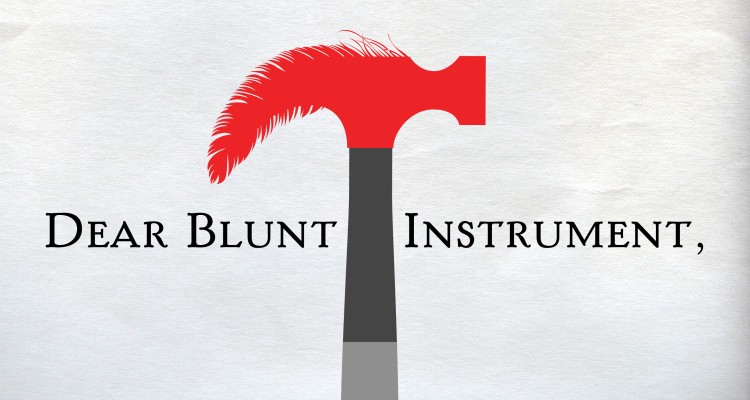Advice
How to Promote Your Book (Without Being Annoying)

The Blunt Instrument is a monthly advice column for writers. If you need tough advice for a writing problem, send your question to blunt@electricliterature.com.
Dear Blunt Instrument,
My first book will come out in 2017 on a small press, and I’m wondering what advice you would offer on how to handle the experience. I’m particularly interested in what to do about self-promotion, i.e., how not to be annoying about it.
Sincerely,
Publishing Noob
Dear Noob,
I’m glad you’re asking this question now (in 2016), because it’s a very good idea to start thinking about promotion well in advance of your book’s publication date.
There can be huge variation in how much time, effort, and money presses are able to put behind promotion — and I find this to be especially true when it comes to small presses. The term “small press” can apply to something as big as Coffee House Press or a tiny labor-of-love micropress producing handmade chapbooks. You can make up for a lack of promotion on your publisher’s part with self-promotion, but of course there is a point of diminishing returns.
You can make up for a lack of promotion on your publisher’s part with self-promotion, but of course there is a point of diminishing returns.
With this in mind, here’s my advice on how to maximize (or at least increase) exposure for your book without making everybody hate you.
Ask your press now what they have planned for promotion, if anything.
If your press has minimal time and/or money for marketing and promotion, or they don’t believe in promoting books, or they just don’t really know what they’re doing, it’s better to know ahead of time. You might have to pick up a lot of slack.
Here are some of the promotional activities you might consider asking about: Will they help you contact authors and critics for blurbs or advanced praise? Will they be sending out a designated number of review copies? How many and where? Will they be sending copies to Library Journal and Publishers Weekly (which will help get it into libraries)? Will they be doing any (print or online) advertising? Do they actively promote their authors on their own social media accounts? Will they be making appearances and selling books at conferences (such as BEA, AWP, ABA)? How will they be distributing your book into stores? Can they help you set up readings and events? Can they help you set up interviews or other features (online or in print or on radio)?
You can also research their recent catalog to get a sense of how much effort they typically put into backing their authors and marketing their titles.
Not every review copy will turn into a review, and the cost of travel for events can quickly outweigh any proceeds from sales. Even relatively well-known authors might only sell a handful of books at a reading.
If they don’t plan to do much of the above, figure out how much of your own time and money you are willing to put into promoting your book. Understand that the ROI of promotion can be iffy; not every review copy will turn into a review, and the cost of travel for events can quickly outweigh any proceeds from sales. Even relatively well-known authors might only sell a handful of books at a reading.
Build your audience before the book comes out.
I’m a believer in social media as a kind of distribution channel for artists. But you can’t just create an account and start broadcasting about your book because there won’t be anybody listening. You also probably won’t have time to be awesome on every social media network there is, so consider focusing your efforts on the one or two networks you’re most interested in and that best align with your work and audience.
People who follow you on social media will buy your book if they are already fans of your work by the time it comes out. So start building a community as early as you can. Use your account to showcase the kind of writing you do. Twitter is the most obvious choice for most writers — handily, poetry and fiction and nonfiction are all made up of either lines or sentences, which usually fit nicely in a tweet. If you’re a critic or a philosopher or a political scientist you can tweet opinions and ideas. You can share comics as images. In other words, be interesting in the same way that your book is interesting, but on social media instead of on paper.
Social media generally works best if you interact on it. On Twitter, you need to actively seek out like-minded people, especially people who write (or write about) work that’s similar to yours. If you want to get even more calculated about it (entering Pick-Up Artist territory), aim for a mix of people who are around the same career stage as you along with more aspirational types (i.e. people with a lot more followers than you).
The trick here, as with making friends and influencing people, is that you kind of have to genuinely enjoy other people or they’re probably not going to enjoy you.
“Be everywhere” when the book comes out.
It’s a really good idea to line up a bunch of stuff just before, during, and after your book’s publication date. By “stuff,” I mean: articles, essays, interviews, craft talk, early reviews if you can get them, even reviews by you of other people’s books (ideally that are somewhat similar to your own).
Two authors I have seen make really good use of this tactic in the past year or so are Matthew Salesses (author of The Hundred Year Flood) and Alexander Chee (author of Queen of the Night). It has the effect of making your name (and your book’s name, since it will appear in your bio) omnipresent around the time of your publication date (or “pub day” in the modern parlance). But if you’re writing about stuff other than your own book (such as favorite or formative books in your genre, for example), then you’re promoting yourself without seeming strictly self-promotional.
But if you’re writing about stuff other than your own book (such as favorite or formative books in your genre, for example), then you’re promoting yourself without seeming strictly self-promotional.
It can take a lot to break through the fog of noise on social media and in life. You might hear or see someone’s name five or ten times and still feel like you have never heard or seen it before, then suddenly on the eleventh occasion you feel like you’re seeing this name everywhere and maybe you should check this person out.
Don’t exclusively boost your book.
Just don’t! Don’t start a blog solely to post book updates. Don’t start a Twitter account if you’re only going to talk about your book. No one will like you. You can talk about your book too much. I unfollowed Rob Delaney when his book came out a couple of years ago because he wouldn’t shut up about it for weeks (and concurrently he stopped being funny).
Some of the time, you should just be having normal conversations. Some of the time, you should be promoting other people. One really good way to do this is by becoming a critic — that way you can promote your own writing while also promoting other people’s work (even negative criticism is a kind of promotion).
If other people mention your book positively on social media or link to reviews, it’s OK to amplify it, but I wouldn’t retweet every compliment you get. People who repeat compliments too often are, frankly, annoying.
Other ideas…
Even if you’ve got next to no money for this promotional stuff, you can do local readings/appearances. Go to local bookstores and see if they’ll carry your book and/or host a reading and signing. When you do readings and events, double-check ahead of time to make sure they will have copies of your book.
If you have connections at local colleges, see about doing a reading or class visit. While you’re at it, let your college or grad program, if you had one, know about the book; you might be able to get the book featured in an alumni magazine.
Email everyone you know (including family!) and let them know you have a book out and how to buy it. (Just once. Don’t spam them.)
Finally, use your author copies wisely. If you have friends with new books, offer to swap copies. If you’re offered more books at a discount, buy more. Send your book to authors you admire. Be generous with it. Add a hand-written note.
I hope this helps you make the most of the launch. Best of luck.
Originally published at electricliterature.com on March 24, 2016.









